《管理学》课程PPT教学课件(Management, 7th Edition)Chapter 20 CONTROLLING FOR ORGANIZATIONAL PERFORMANCE

Ma Chapter 20 CONTROLLING ROB B I N S COULTER FOR ORGANIZATIONAL PERFORMANCE ©Prentice Hall,2002 20-1
Chapter 20 CONTROLLING FOR ORGANIZATIONAL PERFORMANCE © Prentice Hall, 2002 20-1
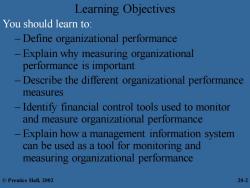
Learning Objectives You should learn to: Define organizational performance Explain why measuring organizational performance is important Describe the different organizational performance measures Identify financial control tools used to monitor and measure organizational performance Explain how a management information system can be used as a tool for monitoring and measuring organizational performance ©Prentice Hall,2002 20-2
Learning Objectives You should learn to: – Define organizational performance – Explain why measuring organizational performance is important – Describe the different organizational performance measures – Identify financial control tools used to monitor and measure organizational performance – Explain how a management information system can be used as a tool for monitoring and measuring organizational performance © Prentice Hall, 2002 20-2
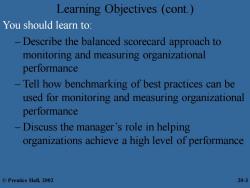
Learning Objectives (cont.) You should learn to: -Describe the balanced scorecard approach to monitoring and measuring organizational performance Tell how benchmarking of best practices can be used for monitoring and measuring organizational performance Discuss the manager's role in helping organizations achieve a high level of performance ©Prentice Hall,2002 20-3
Learning Objectives (cont.) You should learn to: – Describe the balanced scorecard approach to monitoring and measuring organizational performance – Tell how benchmarking of best practices can be used for monitoring and measuring organizational performance – Discuss the manager’s role in helping organizations achieve a high level of performance © Prentice Hall, 2002 20-3
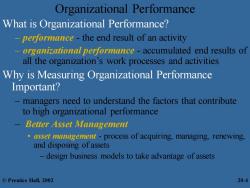
Organizational Performance What is Organizational Performance? performance-the end result of an activity organizational performance accumulated end results of all the organization's work processes and activities Why is Measuring Organizational Performance Important? managers need to understand the factors that contribute to high organizational performance Better Asset Management asset munagement process of acquiring,managing,renewing. and disposing of assets design business models to take advantage of assets ©Prentice Hall,2002 20-4
Organizational Performance What is Organizational Performance? – performance - the end result of an activity – organizational performance - accumulated end results of all the organization’s work processes and activities Why is Measuring Organizational Performance Important? – managers need to understand the factors that contribute to high organizational performance – Better Asset Management • asset management - process of acquiring, managing, renewing, and disposing of assets – design business models to take advantage of assets © Prentice Hall, 2002 20-4
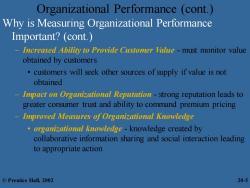
Organizational Performance (cont.) Why is Measuring Organizational Performance Important?(cont.) Increased Ability to Provide Customer Value-must monitor value obtained by customers customers will seek other sources of supply if value is not obtained Impact on Organizationall Reputation strong reputation leads to greater consumer trust and ability to command premium pricing Improved Measures of Organizational Knowledge organizational knowledge-knowledge created by collaborative information sharing and social interaction leading to appropriate action ©Prentice Hall,2002 20-5
Organizational Performance (cont.) Why is Measuring Organizational Performance Important? (cont.) – Increased Ability to Provide Customer Value - must monitor value obtained by customers • customers will seek other sources of supply if value is not obtained – Impact on Organizational Reputation - strong reputation leads to greater consumer trust and ability to command premium pricing – Improved Measures of Organizational Knowledge • organizational knowledge - knowledge created by collaborative information sharing and social interaction leading to appropriate action © Prentice Hall, 2002 20-5
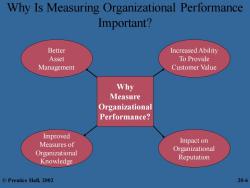
Why Is Measuring Organizational Performance Important? Better Increased Ability Asset To Provide Management Customer Value Why Measure Organizational Performance? Improved Measures of Impact on Organizational Organizational Knowledge Reputation ©Prentice Hall,2002 20-6
Why Is Measuring Organizational Performance Important? Increased Ability To Provide Customer Value Better Asset Management Impact on Organizational Reputation Improved Measures of Organizational Knowledge Why Measure Organizational Performance? © Prentice Hall, 2002 20-6
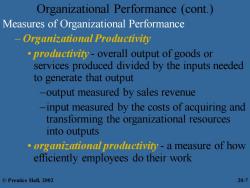
Organizational Performance (cont. Measures of Organizational Performance Organizational Productivity produetviny-overall output of goods or services produced divided by the inputs needed to generate that output -output measured by sales revenue input measured by the costs of acquiring and transforming the organizational resources into outputs organizational productivity-a measure of how efficiently employees do their work ©Prentice Hall,2002 20-7
Organizational Performance (cont.) Measures of Organizational Performance – Organizational Productivity • productivity - overall output of goods or services produced divided by the inputs needed to generate that output –output measured by sales revenue –input measured by the costs of acquiring and transforming the organizational resources into outputs • organizational productivity - a measure of how efficiently employees do their work © Prentice Hall, 2002 20-7
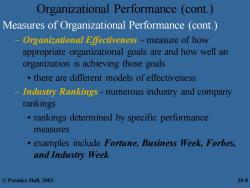
Organizational Performance (cont. Measures of Organizational Performance (cont.) -Organizational Effectiveness -measure of how appropriate organizational goals are and how well an organization is achieving those goals there are different models of effectiveness Industry Rankings-numerous industry and company rankings rankings determined by specific performance measures examples include Fortune,Business Week,Forbes, and Industry Week ©Prentice Hall,2002 20-8
Organizational Performance (cont.) Measures of Organizational Performance (cont.) – Organizational Effectiveness - measure of how appropriate organizational goals are and how well an organization is achieving those goals • there are different models of effectiveness – Industry Rankings - numerous industry and company rankings • rankings determined by specific performance measures • examples include Fortune, Business Week, Forbes, and Industry Week © Prentice Hall, 2002 20-8
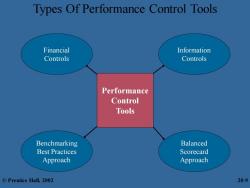
Types Of Performance Control Tools Financial Information Controls Controls Performance Control Tools Benchmarking Balanced Best Practices Scorecard Approach Approach ©Prentice Hall,2002 20-9
Types Of Performance Control Tools Information Controls Financial Controls Balanced Scorecard Approach Benchmarking Best Practices Approach Performance Control Tools © Prentice Hall, 2002 20-9
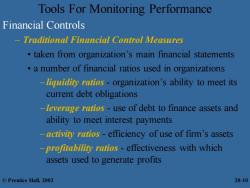
Tools For Monitoring Performance Financial Controls Traditional Financial Control Measures taken from organization's main financial statements a number of financial ratios used in organizations -liquidiny ratios-organization's ability to meet its current debt obligations -leveruge rutios use of debt to finance assets and ability to meet interest payments activiny ratios-efficiency of use of firm's assets -profabilliy ratios-effectiveness with which assets used to generate profits ©Prentice Hall,2002 20-10
Tools For Monitoring Performance Financial Controls – Traditional Financial Control Measures • taken from organization’s main financial statements • a number of financial ratios used in organizations – liquidity ratios - organization’s ability to meet its current debt obligations – leverage ratios - use of debt to finance assets and ability to meet interest payments – activity ratios - efficiency of use of firm’s assets – profitability ratios - effectiveness with which assets used to generate profits © Prentice Hall, 2002 20-10
按次数下载不扣除下载券;
注册用户24小时内重复下载只扣除一次;
顺序:VIP每日次数-->可用次数-->下载券;
- 《管理学》课程PPT教学课件(Management, 7th Edition)Chapter 19 OPERATIONS AND VALUE CHAIN MANAGEMENT.ppt
- 《管理学》课程PPT教学课件(Management, 7th Edition)Chapter 18 FOUNDATIONS OF CONTROL.ppt
- 《管理学》课程PPT教学课件(Management, 7th Edition)Chapter 16 MOTIVATING EMPLOYEES.ppt
- 《管理学》课程PPT教学课件(Management, 7th Edition)Chapter 15 UNDERSTANDING GROUPS AND TEAMS.ppt
- 《管理学》课程PPT教学课件(Management, 7th Edition)Chapter 14 FOUNDATIONS OF BEHAVIOR.ppt
- 《管理学》课程PPT教学课件(Management, 7th Edition)Chapter 13 MANAGING CHANGE AND INNOVATION.ppt
- 《管理学》课程PPT教学课件(Management, 7th Edition)Chapter 12 HUMAN RESOURCE MANAGEMENT(HRM).ppt
- 《管理学》课程PPT教学课件(Management, 7th Edition)Chapter 11 MANAGERIAL COMMUNICATION AND INFORMATION TECHNOLOGY.ppt
- 《管理学》课程PPT教学课件(Management, 7th Edition)Chapter 10 ORGANIZATIONAL STRUCTURE AND DESIGN.ppt
- 《管理学》课程PPT教学课件(Management, 7th Edition)Chapter 09 PLANNING TOOLS AND TECHNIQUES.ppt
- 《管理学》课程PPT教学课件(Management, 7th Edition)Chapter 08 STRATEGIC MANAGEMENT.ppt
- 《管理学》课程PPT教学课件(Management, 7th Edition)Chapter 07 FOUNDATIONS OF PLANNING.ppt
- 《管理学》课程PPT教学课件(Management, 7th Edition)Chapter 06 DECISION MAKING:THE ESSENCE OF THE MANAGER’S JOB.ppt
- 《管理学》课程教学资源(课件讲义)Stephen P.Robbins(9)Chapter 2 Management Yesterday and Today.pdf
- 《管理学》课程教学资源(课件讲义)Stephen P.Robbins(9)Chapter 1 Introduction to Management and Organizations.pdf
- 《管理学》课程教学资源(教师手册)Stephen P.Robbins(9)CHAPTER TWO Management Yesterday.pdf
- 《管理学》课程教学资源(教师手册)Stephen P.Robbins(9)CHAPTER ONE Introduction to Management.pdf
- 《管理学》课程PPT教学课件(Management)Stephen P.Robbins(9)第十二章 人力资源管理 Human Resource Management.ppt
- 《管理学》课程PPT教学课件(Management)Stephen P.Robbins(9)第十章 组织结构与设计 Organizational Structure and Design.ppt
- 《管理学》课程PPT教学课件(Management)Stephen P.Robbins(9)第十五章 理解群体与团队 Understanding Groups and Teams.ppt
- 《管理学》课程教学资源(实验讲义)企业竞争模拟攻略篇.pdf
- 《管理学》课程教学资源(习题与答案)第1章 管理活动与管理理论.doc
- 《管理学》课程教学资源(习题与答案)第3章 全球化与管理.doc
- 《管理学》课程教学资源(习题与答案)第6章 计划与计划工作.doc
- 《管理学》课程教学资源(习题与答案)第十章 组织变革与组织文化.doc
- 《管理学》课程教学资源(习题与答案)第16章 管理的创新职能.doc
- 《管理学》课程教学资源(习题与答案)第1章 管理活动与管理理论.doc
- 《管理学》课程教学资源(习题与答案)第3章 全球化与管理.doc
- 《管理学》课程教学资源(习题与答案)第4章 信息与信息化管理.doc
- 《管理学》课程教学资源(习题与答案)第5章 决策与决策方法.doc
- 《管理学》课程教学资源(习题与答案)第6章 计划与计划工作.doc
- 《管理学》课程教学资源(习题与答案)第7章 战略性计划与战略实施.doc
- 《管理学》课程教学资源(习题与答案)第8章 组织设计.doc
- 《管理学》课程教学资源(习题与答案)第9章 人力资源管理.doc
- 《管理学》课程教学资源(习题与答案)第10章 组织变革与组织文化.doc
- 《管理学》课程教学资源(习题与答案)第11章 领导概论.doc
- 《管理学》课程教学资源(习题与答案)第12章 激励.doc
- 《管理学》课程教学资源(习题与答案)第13章 沟通.doc
- 《管理学》课程教学资源(习题与答案)第15章 控制方法.doc
- 《管理学》课程教学资源(习题与答案)第17章 企业技术创新.doc
